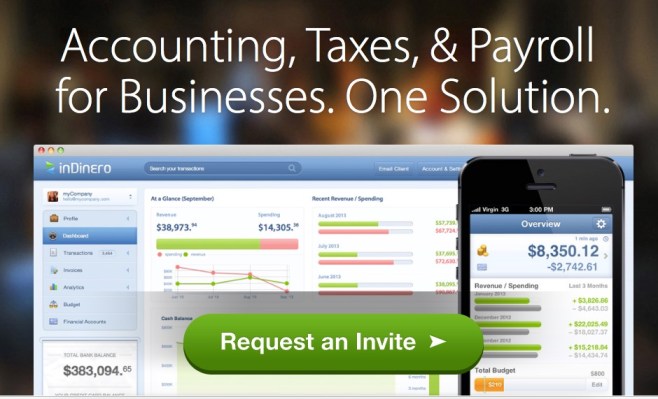Hey, remember inDinero? We covered the Y Combinator-incubated company a couple times back in 2010, when it was trying to build a Mint-style service for small businesses and raised $1.2 million in seed funding.
Well, co-founder and CEO Jessica Mah told me that in the years since, the company nearly ran out of money, laid off all its employees, and switched to a new model. But it seems to have bounced back, and it’s accelerating those efforts with $7 million in new funding.
Instead of a self-service tool for tracking small business finances, inDinero now offers what Mah calls an all-in-one solution for accounting, taxes and payroll. That means businesses don’t need to piece together a bunch of different service providers and software products to get all their needs met — they can just go to inDinero, which offers its services on top of proprietary software.
The model works better for inDinero, Mah said, because it means the company isn’t trying to collect $20 monthly fees from “Mom and Pops” on sites like Etsy, but instead working with “sophisticated, complex businesses” and charging them “thousands of dollars, if not tens of thousands.” (To be clear, Mah said inDinero can work with companies as small as one or two employees and as big as 100 employees.)
And while inDinero’s technology does automate much of that process behind the scenes, Mah acknowledged that it has become a much more service-oriented business. She alternately referred to the model as “accounting-plus-service” and “service-as-a-software” (er, I’m not sure that’s going to catch on), and she suggested that inDinero sees the same kind of margins as a software-as-a-service business.
In fact, she said the company is “pretty close to cash-flow positive,” with periods of profitability last year.
As for the funding, it comes from investors including Kevin Hartz, Bobby Yazdani, Hank Vigil, Fritz Lanman, Coyote Ridge Ventures, SaaS Capital and Streamlined Ventures. Mah suggested that inDinero has been “pseudo bootstrapping” — obviously, it’s raising outside funding, so it’s not actually bootstrapped, but none of the investors are taking a board seat, allowing her to “go straight to the growth equity firms” if she decides to raise more money later.
The company has now raised a total of $10 million. Mah also noted that inDinero’s previous investors still have their stakes in the company.
Despite what appears to be a successful turnaround, she isn’t sugarcoating the company’s past failure. Mah suggested that any business trying to build the aforementioned Mint for small business “will have a very difficult time making money, especially if they’re not the marketplace or payment processor.”
“That’s my belief — I wasted almost three years of my life on it, which is really painful,” she said.
